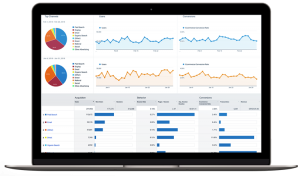This Week’s Industry News
Compiled by the Rocket Clicks Team
Top Stories
Bing Mimics Google Search Header
Bing has been running a limited test of a new search results header. The new header looks very similar to the Google search header, including the grey color scheme and colored magnifying glass. At first glance, the limited design test could be mistaken for Google search. Source: TheSEMPost
AdWords Upgrades Mobile Extensions
AdWords extensions are becoming more powerful than ever with a new update to sitelinks, callouts, and structured snippets on mobile. Sitelinks are now tappable, allowing users to scroll through their sitelink options. Callouts and Structured Snippets will now be included in-line with the ad copy, rather than underneath the ad. Experts believe that this is a good change as callouts and structured snippets aren’t able to be interacted with. Source: Search Engine Land
URL Quick Links Added to Google My Business
A new feature has been added to Google My Business that will allow additional URLs on the listing that lead searchers directly to a specific landing page. The new feature is currently limited to select categories, such as restaurants, but provides the ability to link directly to pages that are used for booking an appointment, placing an order, reserving a table, searching for items, or viewing the menu. Source: Search Engine Land
Google Reaching Out to Site Publishers About Annoying Ads
With the impending release of Google’s built-in ad blocker for Chrome, the company has stated that they will soon begin to notify publishers if they have “annoying ads” on their site and that they will end up getting blocked. They have stated that this isn’t to shame publishers into changing their ad practices, but to assist smaller sites who may not have the same quality control resources. To help combat “annoying ads”, a guide of unacceptable ad types and their suggested replacements has been provided by the Coalition for Better Ads. Source: Search Engine Journal
Keyword Planner Displaying “OK Google” Terms
Recently, webmasters have been seeing search terms in keyword planner that start with “okay Google.” The majority of the appearances have occurred around home sale related keywords. The scattered data has people speculating that these are occurring when people say “okay Google” twice. The term is designed as a trigger to launch search and when repeated Google adds it to the query term. Source: Search Engine Roundtable
Analysis
Ways to Save Underperforming Campaigns
Andrew Lolk wants to help you save your under performing PPC campaigns and has some key optimization tips to help you do just that. One tip is to become an RLSA bidding guru. Whether you add an audience for multiple product page visits or cart abandoners, it’s always beneficial to target previously engaged visitors. Lolk also recommends paying attention to your ad schedule based on two times factors: time of day and day of week. This may help you identify and eliminate potential dead zones, like the late PM hours or weekends. The author also mentions ad testing your way to profitability. Even if you have the perfect set of keywords, you can still fail if you have sub-par ads. He recommends taking your top 20 percent ad groups and writing new ads for them twice a month so you don’t have to spend the time to roll these ad tests out through the entirety of your PPC account. Source: Andrew Lolk, Search Engine Journal
The Potential of Unlocking “(not provided)” Keywords
When Google began switching searches over to HTTPS in 2011, SEOs began losing visibility of organic keywords. One company, Keyword Hero, has begun developing a way to unlock these terms through a combination of monitoring services, cognitive services, and purchased data from browser extensions and displays potential organic keywords only if they have a minimum 83% match certainty. Benefits of having such data would not only help SEOs focus keyword optimization to target more valuable customers, but also provide hard data that can help prove the worth of SEO services and provide an overall better user experiences. Source: Rebecca Sentence; Search Engine Watch




















